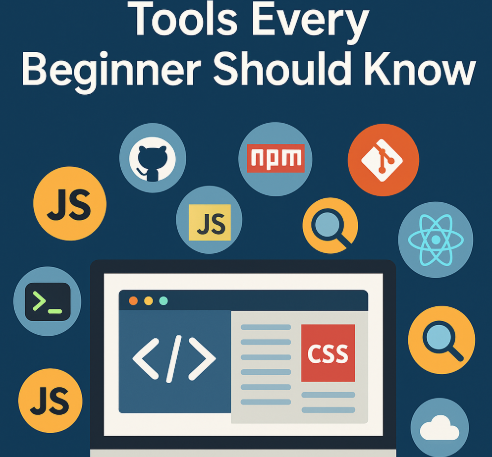
Table of Contents
- Top 10 Web Development Tools Every Beginner Should Know
- Introduction
- Code Editors
- Version Control Tools
- Package Managers
- Frameworks and Libraries
- Browser Developer Tools
- Testing Tools
- APIs and Tools for Mock Data
- Task Runners and Bundlers
- Hosting Platforms
- Conclusion
- FAQs
Introduction
So, you’re diving into web development—exciting stuff! But where do you even begin with all the tools out there? Whether you’re aiming to become a front-end wizard, a back-end brainiac, or a full-stack genius, getting familiar with the right tools early on can make or break your journey.
The Growing Demand for Web Developers
Web developers are in high demand across nearly every industry. With more businesses going digital, the need for skilled devs who can create, maintain, and optimize websites has exploded.
Why Tools Matter for Beginners
Having the right tools is like having the right gear for a hike. Sure, you could go barefoot, but why would you? These tools streamline your workflow, help you avoid beginner mistakes, and let you focus on learning the actual craft of web development.
Code Editors
Visual Studio Code
If there’s one tool every beginner should install first, it’s Visual Studio Code (VS Code).
Key Features
- IntelliSense for smart code completions
- Integrated terminal
- Extensions for nearly everything (Git, Prettier, ESLint, etc.)
Why It’s Beginner-Friendly
It’s lightweight, customizable, and has a massive community. Plus, it’s free—what more could you ask for?
Sublime Text
A close second to VS Code, Sublime Text is another favorite among coders.
Performance and Simplicity
It’s blazing fast and distraction-free, perfect for learning without feeling overwhelmed.
Version Control Tools
Git
Heard of Git but don’t know what it is? It’s your code’s time machine.
What is Git?
Git helps you track changes, revert to previous versions, and collaborate with others—without the fear of losing everything.
Learning the Basics
Start with simple commands like git init, git add, git commit, and git push. Trust us, future-you will thank present-you.
GitHub
Git’s best friend. Think of GitHub as a social network for your code.
Collaboration Made Easy
It allows you to host your Git repositories online, contribute to open-source projects, and build your dev portfolio.
Package Managers
npm (Node Package Manager)
npm is like the app store for web developers.
Managing Dependencies
Need a library? Just type npm install library-name and boom—you’re in business.
Yarn
Another package manager that’s grown in popularity for being faster and more secure than npm in many cases.
Fast, Reliable, and Secure
It uses lockfiles and a deterministic algorithm to ensure consistent installs across environments.

Frameworks and Libraries
Bootstrap
Responsive design? Done. CSS headaches? Gone.
Responsive Design Simplified
Bootstrap helps you build mobile-first websites with ready-to-use components like navbars, modals, and grids.
React.js
If you’re planning to go beyond simple HTML/CSS, React is your go-to.
Build Dynamic User Interfaces
React lets you build component-based user interfaces that are fast, interactive, and scalable.
Browser Developer Tools
Google Chrome DevTools
Built right into Chrome, this is your web development magnifying glass.
Inspect, Debug, and Optimize
DevTools help you inspect your HTML/CSS, debug JavaScript, and test site performance—all in real time.
Testing Tools
Jest
Testing might sound boring, but it’s your best friend when projects grow.
Simplifying JavaScript Testing
Jest makes unit testing in JavaScript easy with a simple API and powerful features like mocks and snapshot testing.
APIs and Tools for Mock Data
Postman
Ever wondered how websites talk to each other? Enter Postman.
Testing and Documenting APIs
Postman lets you send requests, view responses, and document APIs without writing a line of code.
Task Runners and Bundlers
Webpack
As projects grow, managing assets and dependencies gets tricky.
Manage Assets and Dependencies
Webpack bundles your JavaScript, CSS, and other files for faster load times and a cleaner project structure.
Hosting Platforms
Netlify
You’ve built something—now how do you share it?
Easy Deployments for Beginners
Netlify lets you deploy sites directly from GitHub with drag-and-drop simplicity and continuous integration baked in.
Conclusion
There you have it—your beginner-friendly toolkit for diving into web development! These tools won’t just make your life easier—they’ll make you a better, faster, and more confident developer. So pick a few, start experimenting, and remember: the best way to learn is by doing. Keep building!
FAQs
1. What is the best code editor for beginners?
Visual Studio Code is widely considered the best starting point due to its flexibility, extensions, and active community.
2. Do I need to learn Git and GitHub as a beginner?
Absolutely. Even basic Git knowledge will save you from costly mistakes and is a must-have in any developer’s toolbox.
3. How important is testing in web development?
Very! Testing ensures your code works as expected and helps catch bugs before users do.
4. Can I build a website without a framework?
Yes, you can build with pure HTML/CSS/JS. But frameworks like Bootstrap and React make the process faster and more scalable.
5. Is Netlify free to use?
Yes! Netlify offers a generous free tier that’s perfect for learning and small projects.



